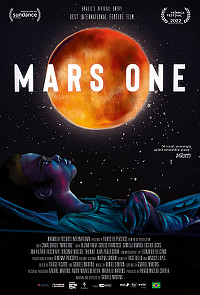| SHADOWS ON THE WALL | REVIEWS | NEWS | FESTIVAL | AWARDS | Q&A | ABOUT | TALKBACK | |||||||||||||||||||||
 Shadows off the beaten path Shadows off the beaten pathIndies, foreign, docs and shorts...
On this page:
ALCARRAS |
INU-OH |
MARS ONE
| |||||||||||||||||||||
| See also: SHADOWS FILM FESTIVAL | Last update 7.Jan.23 | |||||||||||||||||||||
|
Alcarràs Review by Rich Cline | 
| |||||||||||||||||||||
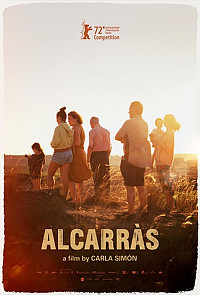 dir Carla Simon scr Carla Simon, Arnau Vilaro prd Maria Zamora, Stefan Schmitz, Tono Folguera, Sergi Moreno with Josep Abad, Jordi Pujol Dolcet, Anna Otin, Albert Bosch, Xenia Roset, Ainet Jounou, Montse Oro, Carles Cabos, Joel Rovira, Isaac Rovira, Berta Pipo, Elna Folguera release Sp 29.Apr.22, UK 6.Jan.23 22/Spain 2h00 BERLIN FILM FEST  Is it streaming? |
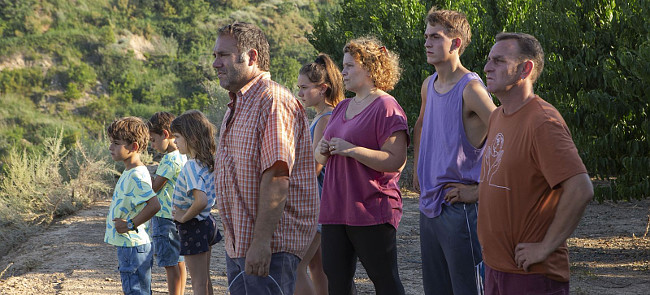 There's a lovely loose ambience in this drama that gives it the feel of a fly-on-the-wall documentary about how an agricultural community in Catalonia faces a changing world. Strong characters have an understated charm, and filmmaker Clara Simon infuses each scene with honest emotions. The observational approach makes the film feel meandering and long, but it's so authentic and full of life that we can't help but get involved. In Alcarras, Rogelio (Abad), his children and grandchildren run a large peach farm. But the verbal contract that established it many decades ago means nothing when the old landowner dies and his son decides to sell the fields that surround Rogelio's house. This causes a series of confrontations that quietly unsettle everyone in the area, including all three generations of Rogelio's family. But they get on with the peach harvest while trying to figure out how to deal with the shifting dynamic both in the countryside and within their home. Simon beautifully captures rhythms of life in this isolated place, with children playing in an abandon car and teens hunting rabbits at night. Roger (Bosch) is cultivating a small secret pot farm before he heads out clubbing in the nearby town, while his younger sister Mariona (Roset) practices dance steps with friends for a coming festival. The narrative emerges organically from carefully observed scenes, and plays out in relationships. And each character has a distinct perspective on the situation, as the changes ripple from the oldest to the youngest family members. Because of the doc-style filmmaking, the actors rarely seem to be acting at all. Indeed, most of the dialog feels like it's captured by chance, which allows it to add complex textures to each person while revealing the connections between them. Bosch and Roset have particularly involving roles as teenagers who are trying to redefine themselves while their family and options change shape around them. Both reveal superb internalised thoughts and feelings in the ways they observe the people around them. Crisply shot and edited, this is a remarkable depiction of a way of life that is vanishing in a modern world that's more interested in profit than quality of life. By taking such a skilful, open-handed approach, Simon creates an unusually detailed depiction of life in this corner of the world. And the intimate storytelling angle makes it strongly resonant, bringing up a range of reactions as each person faces questions about his or her identity and future.
| ||||||||||||||||||||
|
Inu-oh Review by Rich Cline | 
VENICE FILM FEST TORONTO FILM FEST Is it streaming?
| 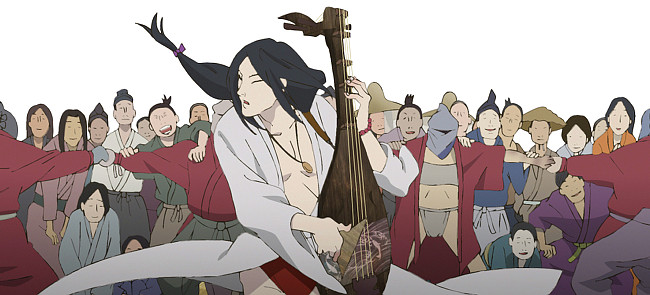 Ambitious and stylish, this Japanese historical drama is rendered with strikingly detailed animation that helps make up for a tricky-to-follow narrative. Director Masaaki Yuasa deliberately indulges in jarring imagery, refusing to wrestle the plot into coherent sense, especially as it spirals into a surreal rock-n-roll musical. What emerges is an intriguing exploration of storytelling, as well as a cautionary tale about trying to rewrite history in your favour. Set 600 years ago, the story centres on Tomona (Moriyama), who was blinded by a curse as a young boy and has become an accomplished biwa musician, singing songs of an epic war 300 years earlier. And because he can't see, he's unafraid of the outcast dancer Inu-oh (Avu-chan), whose face and offbeat physicality terrify everyone else. Together, they begin to perform to enormous crowds, recounting past events in their songs. But the Shogun Yoshimitsu (Emoto) and his priests take exception to Tomona and Inu-Oh's account of history. There's a lovely sense of ancient culture in the imagery, which uses a beautiful 2D style that's elevated with textures, colours and depth of field. Then through Tomona's limited vision, things appear as if in streaky watercolours. Scenes vibrate with a sense of light and darkness, dreary reality and heightened emotion, earthy authenticity and a magical spirit realm. This is definitely not animation for mainstream audiences or children. While it's set in medieval Japan, there's a modern-day attitude woven into the interaction, most notably in the metal-style musical numbers that make up almost the entire second half of the film. Performing provides healing for both Tomona and Inu-oh, because it allows them to confront their pasts head-on. So while the plot and characters are never clearly developed, the dazzling imagery and deeper ideas hold the interest.
|
| Mars One Marte Um Review by Rich Cline | 
SUNDANCE FILM FEST Is it streaming?
| 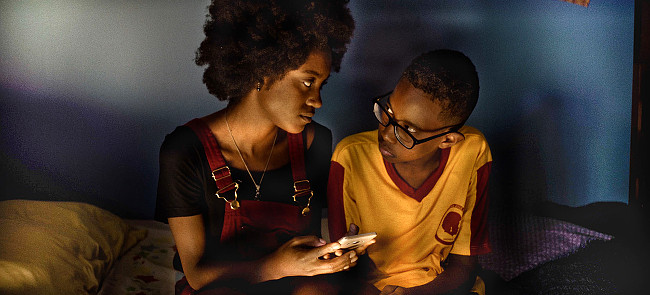 With a sensitive approach, filmmaker Gabriel Martins chronicles a working-class Brazilian family as they cope with a changing society. Set in a sprawling city that feels like it's unraveling at the seams, the film knowingly grapples with thoughts and feelings that are immediately recognisable as these four connected people face an uncertain future. It's beautifully shot and edited, and performed with earthy honesty by a terrific cast. On the morning after 2018's contentious presidential election, the Martins family gets on with their daily routine, even as the landscape looks less hopeful. Handyman at a posh block of flats, Wellington (Francisco) puts his hopes on the football skills of teen son Deivinho (Lucas). But Deivinho is more interested in astrophysics. His sister Eunice (Damaio) is studying law and has a girlfriend Joana (Hilario) she keeps secret from her conservative parents. Then their feisty mother Tercia (Faria) witnesses a shocking incident that rattles her deeply. Each of them has big decisions to make. Sharply observed moments zero in on conflicted emotions under the surface, while scenes are seasoned with commentary about politics, social issues, religion, science and injustice. While Wellington and Tercia face challenges to their expectations, their kids' thoughts are loftier. Deivinho's dream to join a mission to Mars is perhaps just as out-of-reach as a professional football career. Eunice's more practical goal is simply to move out of the bedroom she and Deivinho share so she can begin life with Joana. Each is headed for a dramatic conclusion. These are four very different people who take distinct approaches to the challenges in front of them. Each of them is easy to identify with, even when they reveal dodgy attitudes or make messy decisions. The bond between them is strong, and the actors subtly reveal cracks here and there. A sense of hopefulness allows both Lucas and Damiao to create likeable textures along the way, while Francisco and especially Faria have more difficult roles as grown-ups who have deeply internalised feelings about what's happening around them. There's a slight sense of overreach in the way Martins adds sudden plot points to what is essentially a warmly comical portrait of modern life. These include a couple of well-worn story elements, such as addiction issues and major coincidences. This may add some urgency while pushing characters into corners, but it also distracts from what is otherwise an organic collection of skilfully underplayed interactions between people whose individual aspirations bracingly reflect our own.
| 
See also: SHADOWS FILM FESTIVAL © 2023 by Rich Cline, Shadows
on the Wall
HOME | REVIEWS | NEWS | FESTIVAL | AWARDS
| Q&A | ABOUT | TALKBACK | | |||||||||||||||



